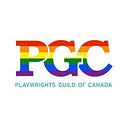Featured Member — Yolanda Bonnell

**Each month we interview member playwrights to share their work, stories and inspiration with the community. We recently spoke with Yolanda Bonnell, a Queer 2 Spirit Ojibwe/South Asian performer, playwright and poet from Fort William First Nation in Thunder Bay, ON. She is now based in Tkarón:to, where her Dora nominated solo show, bug is set to hit the stage again at Theatre Passe Muraille in 2020.
How did you get started as a playwright?
I’ve loved writing since I was a young child. It was one of the first things I realized I could do. I read a lot and so the idea of creating my own worlds and characters to escape to opened up all sorts of possibilities. I began with poems and short stories and silly film scripts, but didn’t start moving on to theatre until I was older. I wasn’t exposed to much theatre, growing up in Northwestern Ontario, save for the plays we did in school. Once I began acting again, it opened up my voice slightly. Then I moved to Toronto and graduated from theatre school — it was then my voice really opened up. I found what my artistic voice was — what I wanted to say. The stories I wanted and needed to tell. All of my plays have been supported by development festivals, creator’s units and residencies. They’ve helped a lot to give me time and support to really hone in on my storytelling.
What was the inspiration behind bug?
bug began as my third and final year project in school. Originally, we were to choose a word and create from it. On my walk to school one day, I noticed a small sow bug crawling across the sidewalk and it just hit me all at once. How much of a struggle that is to be so vulnerable — at risk of being just stepped on and killed. Yet they have to keep going to survive. They have to cross the sidewalk. As an Indigenous woman, I related to that struggle. I don’t even know if I fully understood the implications of that relation, but the word bug stuck to me. Over the course of the months and years that I began to write it and develop it, I thought about my own struggles growing up on and off the reservation. My relationship with addictions and self harm and abandonment and mental illness and domestic and sexual violence. My sisters’ relationships with those things. My Mother’s. I thought about the women on the street. The high rates of homelessness or women in shelters. I thought of when we stayed in a crisis shelter. I thought of all the substance addictions that plague our women. I thought of the seeds of colonization and intergenerational trauma. I also thought of the resilience of Indigenous women. And how we continue to fight. I created this story — which is fiction — inspired by a number of very real experiences.
You’ve performed bug 8 times now with an upcoming show in 2020, did you ever think your work would succeed in this way?
I was honestly pretty surprised to see how quickly it progressed and how much interest people took in me and my work. I always hoped and wished that I would be in this position, but the reality — my reality, growing up — didn’t support this dream. For a long time, I was scared that it would remain only a dream. Creating for a living was not, in any way, something I actually thought could happen for me.
As for bug — I think people see aspects of themselves in the story. Even non-Indigenous people. And that was the hope — that folks would feel represented and seen — particularly Indigenous women. And if that is my only success from this show, then I’ve done my job.
As a performer and a playwright, which do you enjoy more?
This is such an unfair question!
I mean — I love performing. I’ve loved it for a very long time. There’s something quite beautiful about inhabiting experiences, physicality, vocabulary. It’s always been somewhat of an escape for me and I love the challenge. But … writing was my first love. The first thing I ever wrote was a poem called ‘Freedom’ when I was about 7 or 8. I feel as if I’ve always had a political streak. I love telling stories. I love creating. I love inspiring emotion and giving voice to stories that might not have the opportunity to be told. I see myself sort of as a channel in that way. There’s nothing like the feeling when someone comes up and says that they saw themselves in your work. It means I’m doing something right and I did it using my own voice.
Where do you see yourself and your works in 10 years?
Well assuming we’re all still around in 10 years … my hope is that I’m still writing — maybe directing more and facilitating workshops. I want to make change in communities — particularly for Indigenous youth who may be trying to find their artistic voice. I feel like I’m stepping further into leadership roles, so perhaps that’s an option as well. Who knows?!
As a fairly new member, what sparked your interest in joining PGC?
I appreciated the opportunities being a member offered. I had also heard some good things from other folks who are members.
Disclaimer: Playwrights Guild of Canada (“PGC”) is a national arts service mandated to engage and grow an active Canadian writing community. We promote Canadian plays around the world to advance the creative rights and interests of professional Canadian playwrights for the stage. The views of our members are their own. The opinions of PGC as an association remain neutral.
